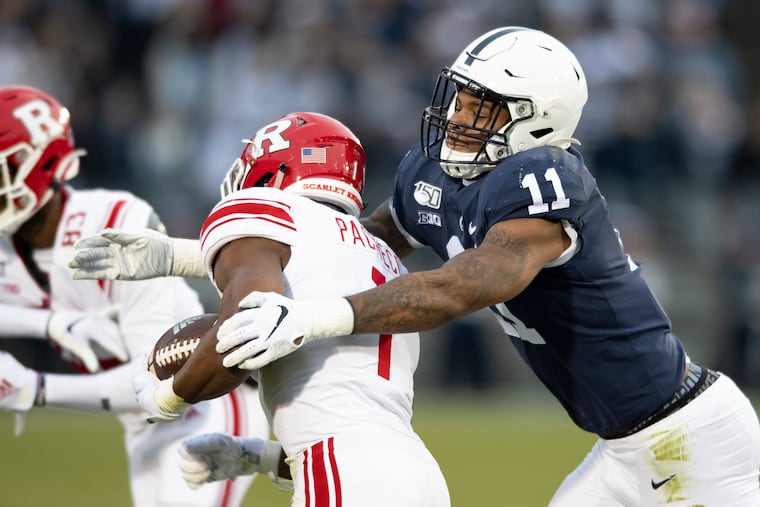Penn State’s Micah Parsons, others wisely follow Eagles’ Marquise Goodwin, opt out of 2020 season | Marcus Hayes
Six college players, including reportedly the Nittany Lions' star linebacker, have bailed due to COVID-19 fears. That number will mushroom.

Projected first-round receiver Rashod Bateman doesn’t trust the NCAA, Minnesota football, or even the NFL, so he’s not playing until he believes the game is safe to be played.
Reportedly, Penn State linebacker Micah Parsons, who is projected to be drafted among the top five picks, is forgoing 2020, too. So is top-flight cornerback Caleb Farley of Virginia Tech. For now, there are six in all. They are a trickle. Expect a flood.
The NCAA won’t spike this doomed football season, so the players who can must protect themselves. Why would someone like Clemson junior quarterback Trevor Lawrence risk himself during a COVID-addled, watered-down, pandemic-shortened season? Why would any top player?
Every incoming senior or junior or who can reasonably expect to be taken in the first three rounds of the 2021 draft should opt out of the 2020 season. If the NFL’s COVID-19 strategies fail, he won’t play next season, either.
An Eagles receiver who opted out of his first season in Philadelphia influenced Bateman’s stance.
“I would definitely sit that out too. My health comes first,” he told ESPN on Wednesday. “Marquise Goodwin -- I saw what he did. I respect him for doing that, because a lot of people don’t have the courage to do that, and I feel like I have the courage to do that.”
In the coming days, expect more and more top collegiate players to find the courage. An agent told ESPN that, as coronavirus cases continue to pummel the United States, more than 30 dozen top players might choose discretion over valor this fall. It should be 100.
This is the best choice for all college players, and, really, the only choice for the best of them. Why risk sickness, or injury, in a sham of a college season being played during a pandemic solely for the profit of television rights- holders, conferences, the NCAA, and its member schools? The kids won’t get nearly enough reward to validate their risk.
So, why is it more acceptable for NFL players to return to play than college kids?
Because NFL players have a union that protects their interests; college kids don’t. Because NFL players are professionals with greater control over their environments than college kids. And because some NFL teams, such as the Eagles and Saints, have made semi-quarantine accommodations available for players who don’t feel comfortable commuting back to a home where at-risk relatives might live.
Rest assured, by the time the season starts, this will be universal; by the time it ends, it will be mandatory.
The NCAA, the conferences, and the schools themselves can implement as may safeguards as they like, but we’ve seen positive tests or outright outbreaks at every school that won a national championship in the last 15 years -- LSU, Clemson, Alabama, Ohio State, Florida State, Auburn, Florida, and Texas. The best and richest programs can’t control COVID, and training camp hasn’t started yet. Imagine the peril the players will face when fraternities reconvene.
Forget that tired argument about the invulnerability of the young and healthy. COVID can crush anyone.
Offensive linemen, like Indiana freshman Brad Feeney, carry lots of extra weight to anchor themselves in the trenches. Extra weight makes you more likely to experience worse complications from COVID-19. Feeney was healthy when he reported to volunteer workouts last month, but then an outbreak among the football team sent him to the emergency room with breathing problems, and he now might have heart complications similar to those that shut down 27-year-old Red Sox lefthander Eduardo Rodriguez.
Parsons, Bateman, and every other college football player knows they can’t trust their coaches, who will abandon them at the whiff of a better-paying job; and they certainly cannot trust administrators. Many of the college suits are revealing themselves as monsters, ravenous for all of the money they can squeeze out of sickened young bodies, but with no appetite for decency.
In an interview with HBO’s “Real Sports,” SEC commissioner Greg Sankey, whose conference generates billions of dollars in revenue every year, asserted that, before athletes were summoned back to campus, some were working out in grimy home gyms teeming with coronavirus, without guidance or oversight. He contends that they are, in fact, better protected having traveling back to campuses in regions where the coronavirus is raging. He then refused to supply the number of SEC athletes who had been infected. No wonder.
Eleven of the 13 states with populations of at least 2 million and 14-day coronavirus growth rates of at least 26.8% are home to SEC schools. It is a hot-spot conference.
In a conference call with leading SEC players last week, as reported by the Washington Post, Sankey and other SEC officials shrugged and said positive tests were inevitable, then intimated the athletes should accept that inevitability. Said Sankey: “... There aren’t any guarantees in life.”
Here’s one: College football will always chase the money.
Indiana University’s outbreak sent Feeney to the ER. Rutgers popped more than 30 cases last month and last week became the sixth Big Ten school to temporarily shut down “voluntary” workouts.
The kids are getting wise. If they think they can afford to miss the season, and if they’re at risk, or if they’re just worried, they’re giving the opt-out option serious consideration. As well they should. They know Sankey and his confederates see players as nothing more than faceless, disposable, low-wage labor.
As they always have.